Inflammation is characterized by localized physical reddening, swelling, or warming that generally causes pain. Inflammation is usually a reaction to an infection or an injury. Inflammation is very common in dogs, much like humans. In fact, dogs are widely known to have chronic inflammation in their bones as well as in the digestive system.
Though outside inflammation can be treated, it is comparatively more difficult to treat or even know about internal inflammation. It is not rare for digestive inflammation to cause problems in the gut’s functioning.
These problems can cause vomiting, reduced appetite, weight loss, diarrhea, and deficiency of critical nutrients. This, in turn, weakens your pet dog and makes them susceptible to a host of other health hazards.
Osteoarthritis is a serious issue that’s infamously common in canines. Any type of arthritis, including osteoarthritis, causes inflammation. As our four-legged companions can’t speak of their pain, unless you are very close to your dog it’s hard to notice when the problem begins. It is very destructive already if it reaches a serious stage without sufficient treatment.
How Do Dogs Experience Inflammation?
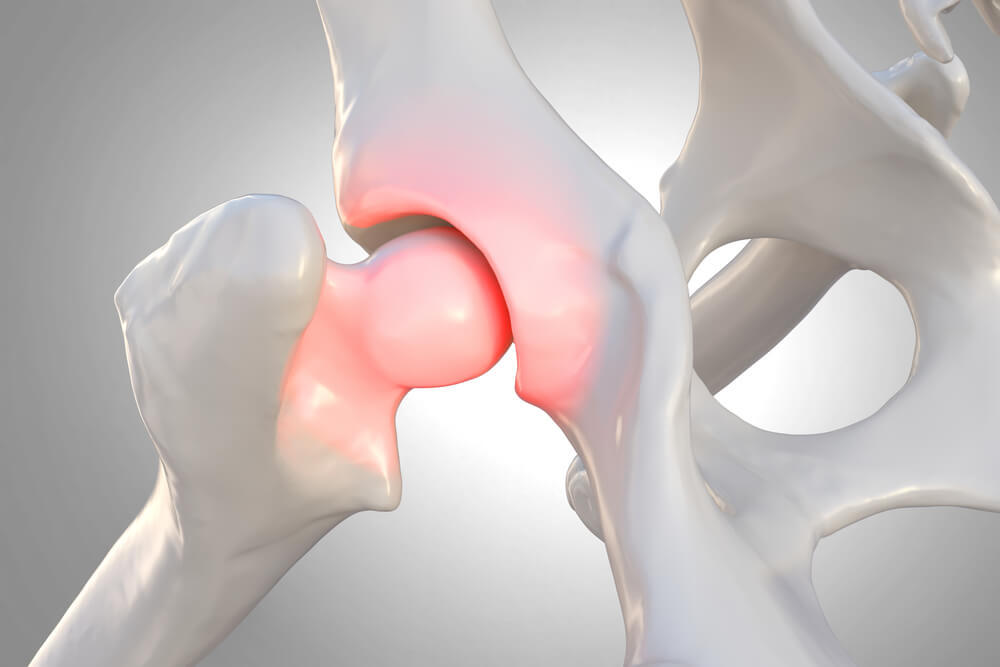
Dog bone with visible hip joint and femur affected by inflammation due to dysplasia
Dogs experience inflammation in various ways. Skin inflammation and arthritis are the most common of the lot. Apart from these, steatitis or yellow fat disease and enteritis are also pretty common. Enteritis is the inflammation of the small intestine and this one is more likely to be picked up by the owner because it typically begins with diarrhea.
What causes inflammation in dogs?
Well, the cause can range from genetics, metabolic disease, and food allergies to parasites, bacterial infections, and even environmental stress. More often than not, it’s one of these causes behind inflammation and not injuries – which owners might find more probable
Natural Anti-Inflammatory For Dogs
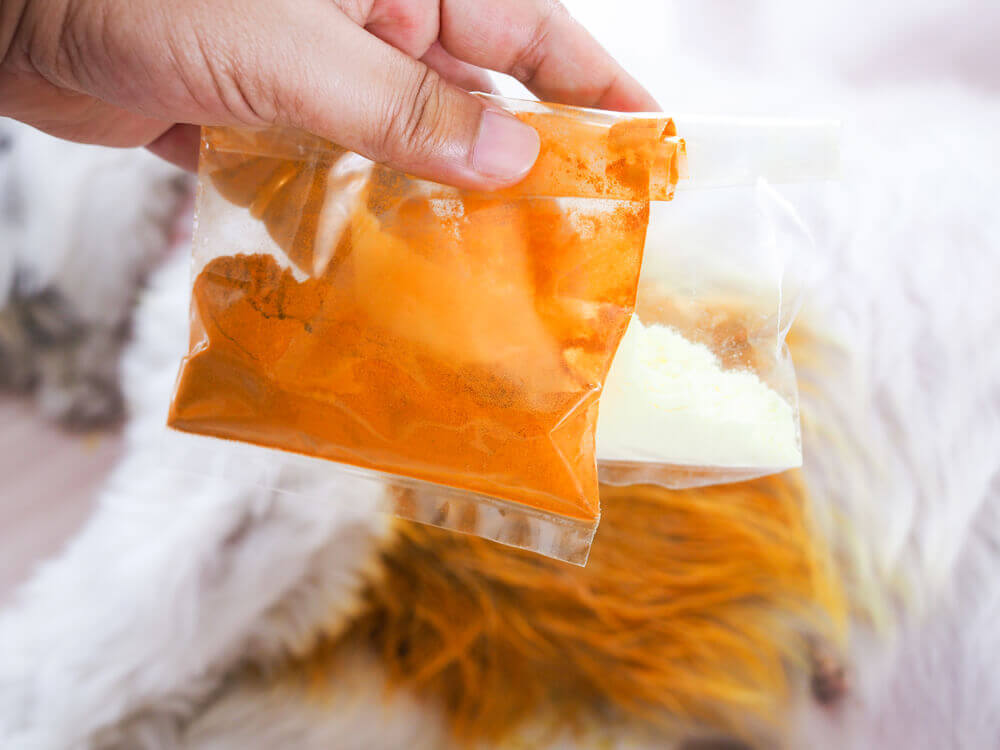
Turmeric has anti-inflammatory properties and is considered safe for canines in small quantities.
There are some great
naturally occurring anti-inflammatories for dogs. These include fish oil, turmeric, harpagophytum, flaxseed, cayenne, biotin, hawthorn, ginger, yucca, Boswellia serrata, glucosamine (very rare in nature, mostly taken as supplements), and cinnamon.
Reducing your dog’s inflammation naturally is very possible especially if caught at an early stage. It’s not rare for dog owners to solve inflammation issues with a little bit of research and care without the help of vets. This is entirely done with the help of natural anti-inflammatories for the most part.
Anti-inflammation supplements and drugs also exist for dogs. However, you are only recommended to resort to those if the condition is severe or if the root of the inflammation is at an advanced stage. It is safe to say that natural remedies will suffice in almost any other case.
Turmeric is perhaps the most important and well-known anti-inflammatory. It lives up to its reputation of being a great natural anti-inflammation remedy in general, even for humans. However, dogs cannot be forced to take turmeric. You have to be smart about how you mix these natural substances in your dog’s daily meal.
Some natural anti-inflammatories are more well-known than others. Consequently, their accessibility is also better. For example, it is much easier to acquire turmeric, ginger, or a natural source of cayenne than it is to find harpagophytum/devil’s claw.
In all likelihood, however, it is possible for you to get supplements with these components online if common remedies are not working.
What is a Good Anti-Inflammatory Diet for Dogs?
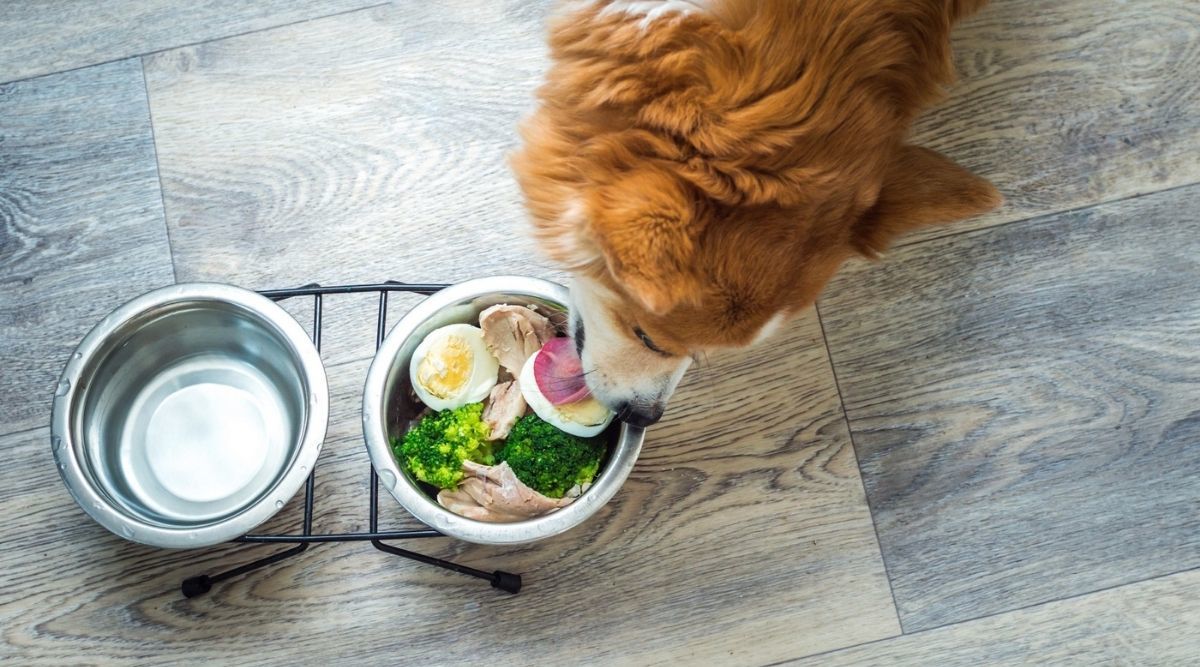
Only provide your doggo with diets and supplements that are specifically designed for dogs.
Does diet influence inflammation? As it turns out, meals rich in protein and low in carbs are great in providing relief from inflammation naturally.
It’s not that simple, however.
A good diet can still be insufficient if the absorption of its vital components is slow or ineffective. In any case, we recommend trying a well-balanced diet first before you go for supplementation.
An ideal anti-inflammatory diet for dogs consists of:
- High protein content and low carbs,
- High fatty acids content,
- Many fibrous vegetables, and
- Low-sugar nutrients.
A good home-based recipe can be prepared with chia seeds, hemp hearts, eggs (peeled, hardboiled, chopped), uncooked quinoa, ground sirloin, green beans, blueberries, turnip greens, shredded carrots, and an Omega-3-rich oil. Avoid anything that might trigger an allergy in sensitive areas such as the GI tract, skin, or bowels.
Diet alone isn’t going to be a magic pill.
You also need to maintain a healthy weight for your dog. Completely avoid highly processed foods. Keep your dog physically fit. Provide plenty of fresh water. Make sure there are no environmental stressors.
Inflammatory Foods To Avoid
There are certain types of foods that worsen inflammation in dogs. A StemCellVet article [1] mentions the following foods as being inflammatory for dogs:
Glycoalkaloids
Vegetables with glycoalkaloids are harmful for inflammation. These include vegetables in the nightshade family/Solanaceae family: potatoes, eggplants, peppers, and tomatoes.
A 2020 study [2] found that experimental animals went through a host of liver- and weight-related issues on receiving a glycoalkaloids-rich diet.
Grains
Grains such as wheat, barley, and rye can also cause inflammation in dogs. The reason is that gluten is difficult for dogs to digest. This creates toxicity in the digestive process, leading to inflammation and pain.
Fillers in Dog Food
Fillers are also to be avoided. Many dog foods include ingredients ending with “bran”, “hull”, “meal”, or “byproduct”. Steer clear of such products if your dog is experiencing inflammation. Only buy dog food that contains whole ingredients.
These fillers can negatively impact joint health as they lack any substantial nutritional value. They are good to satiate your dog but that is not a priority during inflammation. Make sure your dog is getting a nutritional meal at all times.
16 Anti-Inflammatory Foods For Dogs
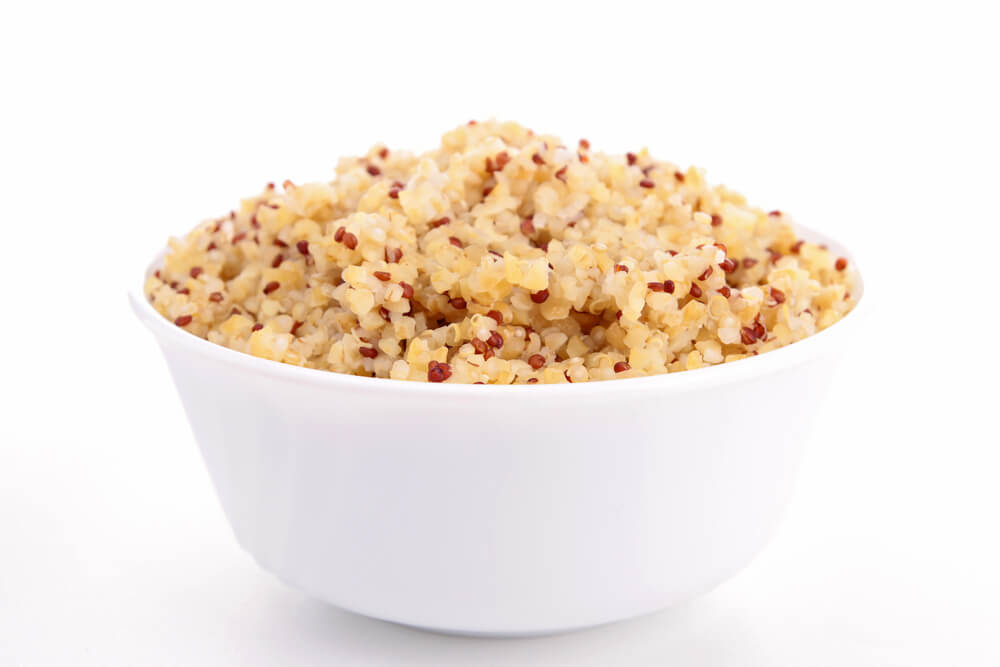
Quinoa is high in anti-inflammatory phytonutrients and contains small amounts of healthy omega-3 fatty acids.
A bunch of human foods is good for your dog’s inflammation condition. These include (alphabetically):
- Alfalfa: Good for arthritis and joint pain.
- Apples: Vitamin C in apples helps in reducing inflammation.
- Blueberries: Another great source of vitamin C.
- Carrots: Beta-carotene and antioxidants help reduce inflammation.
- Celery: Antioxidants and vitamin E help in inflammation.
- Coconut: Raw coconuts have polyphenols that fight free radicals.
- Fish: Deboned fish can easily replace meat and contains many anti-inflammatories.
- Ginger: Known to reduce arthritis [3][4].
- Kale: Loaded with vitamin C.
- Mangoes: A superfood with many benefits including anti-inflammatory qualities.
- Papaya: Vitamin C and antioxidants.
- Parsley: Vitamin K helps reduce inflammation.
- Quinoa: Loaded with anti-inflammatory phytochemicals.
- Spinach: Vitamins C and E reduce inflammation.
- Turmeric: Major known anti-inflammatory.
- Lentils, sweet potatoes, and zucchini are also good for inflammation.
7 Anti-Inflammatory Supplements for Dogs
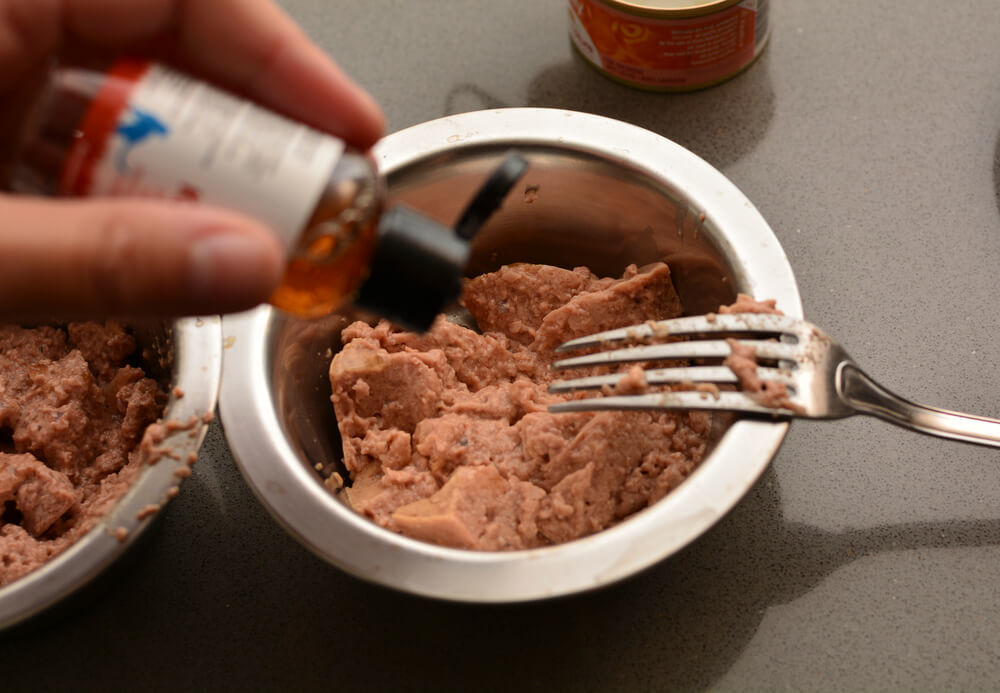
As always — be sure to discuss your dog’s diet with your veterinarian before implementing any new supplements.
It is time for anti-inflammatory supplements for your dog if homemade foods are not having any major relief. Here are some supplements you can go for which include a formula using natural and other compounds to provide more effective relief from inflammation:
1. PawfectChew’s Bundle of Fish Oils and Hemp Treats

An amazing combination that provides ample anti-inflammatory relief, among other benefits. The key ingredients in this bundle include Omega-3, 6, and 9 fatty acids (with EPA and DHA), minerals, vitamins, biotin, glucosamine, chondroitin, turmeric, MSM, and hempseed oil and powder. This is a power pack that has anti-inflammatory properties as well other benefits all packaged in a chewable form that dogs will love.
Where to Buy: You can grab your anti-inflammatory supplement from Amazon.com.
2. Spot Farms Chicken Strips with Glucosamine & Chondroitin Dog Treats
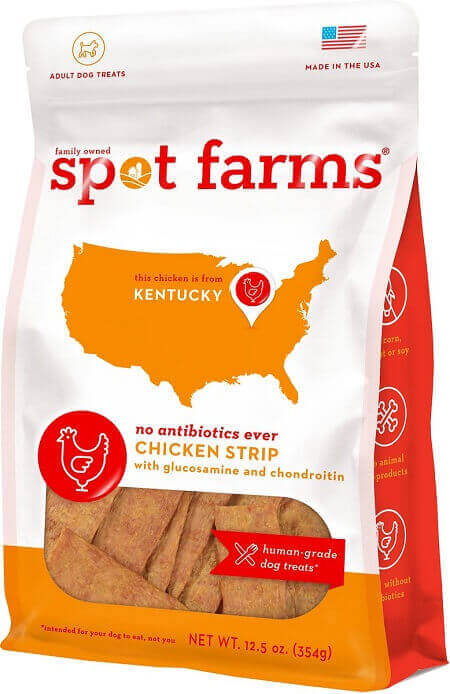
Both glucosamine and chondroitin are good for inflammation and cannot be found naturally.
Where to Buy: This Spot Farms dog supplement can be bought online at Chewy.com
3. Kin+Kind Organic Hip and Joint Pet Supplement

Is good for bone and joints related inflammation, including arthritis. This USDA supplement contains effective dosage of turmeric and coconut.
Where to Buy: Kin + Kind supplements are found in some pet shops and online stores including Amazon.
4. Wet Noses Apple & Ginger Dog Treats

Is a ginger supplement that works well with a home-based anti-inflammatory recipe. It’s non-GMO and made in the USA with pup-approved ingredients you can trust.
Where to Buy: These hard to find human grade dog treats are sold exclusively on Chewy.
5. Olewo Rootsies Food Topper

A little expensive, but a great food topping when everything else fails. Add this to a meal rich with natural anti-inflammatories and let the alfalfa work its magic. Another added bonus is that it contains gut friendly nutrients helpful for food transitioning.
Where to Buy: Grab your dog’s nutritional boost for gut health on Amazon.
6. Wholesome Pride Pet Mango Slices Dog Treats

We recommend Wholesome Pride for mango treats. it is a simple mango-based treat with no grains. Sourced directly from farms, if your dog loves mangoes, it will love this treat.
Where to Buy: You can grab a sample bag of these mango dog treats from Amazon.
7. Herbsmith Smiling Dog Kibble Seasoning
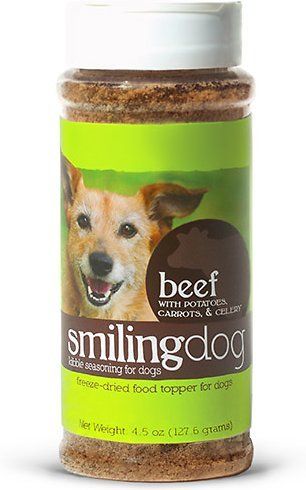
Has multiple anti-inflammatories in a single tasty formula. The ingredients include freeze-dried beef, potatoes, carrots, and celery. Add this topper to ANY wholesome meal. There are no additives or fillers in this either and is sourced and made in the USA.
Where to Buy: Grab your kibble seasoning sample on Amazon or Chewy.
For topical remedies, we recommend Sulfodene Ointment for cuts, bites, and other injuries. Internal inflammation cannot be treated topically. You might also want to look at medicated shampoos and lotions for supportive benefit. However, for the most part, the 8 supplements mentioned in the list above will suffice.
Note that many food supplements have turmeric. However, that’s for coloration and not health benefits. Only choose turmeric-rich supplements.


